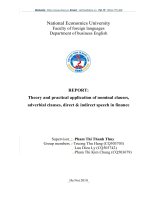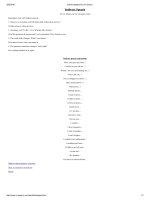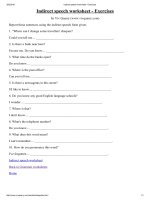17616 indirect speech
Bạn đang xem bản rút gọn của tài liệu. Xem và tải ngay bản đầy đủ của tài liệu tại đây (92.09 KB, 3 trang )
Direct Speech
QUOTATION
QUOTED
Indirect Speech
SAY
Reported Speech
We need to
TELL
Use “to”.
We use say when we name
When we name
the speaker and
the listener.
He told me that…..
Only the speaker.
He said that…..
(to me)
For greetings and farewells: He said hello,
For facts and pieces
He said hello to us. .
Of Information :
He our teacher every day. For giving
He told us his age.
Yes – No answer and stating polite phrases :
She said yes. They always say no. We say been you after
someone sneezes.
Pronouns (+ Who/ whom)
CHANGES
“REFERENCE
WORDS”
PossessiveTOAdjectives
(Whose)
Time and Place
As the listener you must change thus so that the statement is logical
“I need to learn my lesson,” Paul said.
Paul said that he needs to learn his lesson.
“I have
anPLACE
English test tonight,” Tina said. (Monday)
TIME
AND
You told them a story.
TUESDAY
Tina said that she had an English test last night.
SUNDAY
Tina said that she had…. That night.
“My test is here at the CBA,” Tina said
She said that her test was there at the CBA.
TIME
“TODAY”
that day / yesterday.
“TOMORROW”
the next day / the following day.
“YESTERDAY”
the day before.
“NOW”
then / at that moment / at that time.
PLACE
“HERE”
there
“THIS”
that
“THESE”
those
VICEVERSA
If we are reporting facts or
VERB CHANGES
general truths.
If there´s immediate reporting. If the reporting verb is in
the simple present. Informal conversation.
SHIFT
PRESENT FUTURE
PAST
NO CHANGES
PAST
PAST PERFECT
PAST PERFECT = PAST PERFECT( NOWHERE TO SHIFT)
DIRECT SPEECH
REPORTED SPEECH
Simple Present
Present Continuous
Simple Past
Past Continuous
Past Simple
Past
Present Perfect Simple
Perfect
Past Perfect Simple
Simple
Past Continuous
Past
Present Perfect Continuous
Perfect
Past Perfect Continuous
Continuous
Future (Going to)/ Future (will)
(Was/Were going to) (Would)
Conditional
EXAMPLES
“I will study hard” she said she would study hard.
“I´m going to study hard” she said she was going to study hard.
“I study hard” She said she studied hard.
“I am studying hard” she said she was studying hard.
“I have studied hard” she said she had studied hard.
“I studied hard” she said she had studied hard.
“I was studying hard” she said she had been studying hard.
“I had studied hard” she said she had studied hard.
“I had been studying hard” she said she had been studying hard.









